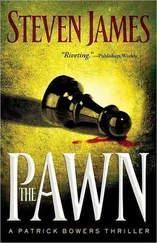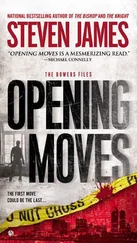Steven James - The Bishop
Здесь есть возможность читать онлайн «Steven James - The Bishop» весь текст электронной книги совершенно бесплатно (целиком полную версию без сокращений). В некоторых случаях можно слушать аудио, скачать через торрент в формате fb2 и присутствует краткое содержание. Жанр: Полицейский детектив, на английском языке. Описание произведения, (предисловие) а так же отзывы посетителей доступны на портале библиотеки ЛибКат.
- Название:The Bishop
- Автор:
- Жанр:
- Год:неизвестен
- ISBN:нет данных
- Рейтинг книги:4 / 5. Голосов: 1
-
Избранное:Добавить в избранное
- Отзывы:
-
Ваша оценка:
- 80
- 1
- 2
- 3
- 4
- 5
The Bishop: краткое содержание, описание и аннотация
Предлагаем к чтению аннотацию, описание, краткое содержание или предисловие (зависит от того, что написал сам автор книги «The Bishop»). Если вы не нашли необходимую информацию о книге — напишите в комментариях, мы постараемся отыскать её.
The Bishop — читать онлайн бесплатно полную книгу (весь текст) целиком
Ниже представлен текст книги, разбитый по страницам. Система сохранения места последней прочитанной страницы, позволяет с удобством читать онлайн бесплатно книгу «The Bishop», без необходимости каждый раз заново искать на чём Вы остановились. Поставьте закладку, и сможете в любой момент перейти на страницу, на которой закончили чтение.
Интервал:
Закладка:
“I want what’s best for the Bureau, Greg.”
He waited as if expecting her to go on, but when she didn’t he said, “You can’t prove any of this.”
“Give me time. I’m pretty good at connecting the dots.”
He poured ketchup on the fries. “So you want me to resign, is that it?”
“I want you to give a press conference. Explain your reasons. Clear the air.”
“And then resign?”
“Do what you feel is right.”
He left the fries alone but drank some more beer, and it seemed to bring him new resolve. “You quoted a bogus regulation to keep Bowers off this case for forty-eight hours.”
“He was shot. I was doing it for the good of the Bureau. For his own good.”
“That might not be how the Office of Professional Responsibility will see it. We all know your history with Bowers; you’ve been gunning for him for years. I assigned him to the case, and even though he was willing to continue working it, and physically able to, you lied to him, pulled him from it, and hampered the investigation. It might have put innocent people’s lives at risk.”
“That’s absurd.”
His voice grew softer, but colder. “You didn’t follow up to make sure the ME positively identified the body found at the primate center Tuesday evening. If you had, Mollie might still be alive. Two hours ago the Summie family filed a lawsuit against the Bureau. Now that’s on your shoulders. Something you’re going to have to answer for.”
Margaret hadn’t heard about the lawsuit and wasn’t sure what to say.
“If you want to play hardball, Margaret, I can play hardball.”
“With all due respect, sir. Bring it on.”
A stiff silence.
“Do you know where she is?” Margaret asked. “Renee Lebreau?”
“No.”
“Do you know why she might have disappeared this week?”
A deep sadness swept across his face, and Margaret was shocked to see how quickly his demeanor changed. “Basque,” he said. The strain in the word told Margaret that Greg had not just known Renee casually. “I was wrong about him.”
“So now you believe he’s guilty?”
No reply.
“Is she dead, Greg?”
He shook his head. “I don’t know. I haven’t seen her in over a year.” Margaret wasn’t sure if she believed that. She waited for him to go on.
Rodale cradled his beer in his hands, and she realized that he looked small and frightened. But she was wary. She’d learned long ago that when people get scared they become desperate. And desperate people take desperate measures.
He took a breath, met her gaze. “Think about what I said concerning you and Bowers. Your last run-in with OPR ended up with you stuck at a satellite office in North Carolina for what? Almost five years? Think about your future, Margaret.”
“Oh, I am, Greg.” She stood. “That’s why I came here tonight.”
Then she paced out the door and left for home to prepare the statement she was going to give to the press tomorrow morning.
99
Lien-hua and I were on I-95 heading toward Quantico.
I checked my texts again. Tessa was home and she was fine and I was starting to feel like an overprotective parent-not a bad feeling. I had Lien-hua text Tessa for me, asking what she was doing, and she replied: “nmjc c/dw.”
I knew that nmjc was teen texting lingo for “nothing much just chillin’.”
With a little deduction I realized c/ is short for the Latin word “cum,” which means “with,” and dw would be Detective Warren.
I only wished it was that easy to decipher this case.
As Lien-hua set down the phone, she said, “So what are these tunnels you’d like to explore?”
“Psychopathology and justice reform.”
A moment. “Go on.”
“Here’s what I’ve been thinking. The congressman is financially in bed with this whole neuroscience research industry.”
“That’s Washington, Pat. Special favors, lobbyists. Politics as usual.”
“Except that because of the location of Twana’s murder, it ties in with this case. Besides, people only lobby when they have an agenda. And it’s almost always either money or morals-to make a buck or to make a point.”
“That sounds like profiling.”
“Just an observation.”
“No, definitely profiling. I must be wearing off on you.”
“Well, I won’t argue with that, but here’s the thing: the Gunderson Foundation is researching primate metacognition, neuroscience, and aggression-the neurology of violence. Meanwhile, Fischer is cosponsoring a bill that’ll provide federal funding for the in-vitro testing of babies for neurological or genetic disorders.”
She listened quietly. “I didn’t know that.”
“And two of his biggest campaign supporters are firms that provide this service.”
“They stand to benefit a lot if the bill passes.”
“And if they benefit, so does he.”
Silence. “How do you see this relating to the murders?”
“I’m not sure, but in the context of the Project Rukh files and Gunderson Foundation research, what if scientists could do that?”
As a profiler, Lien-hua was one of the Bureau’s top experts on criminal psychology. I was anxious to hear her take on this. I continued, “What if it were possible to definitively identify the specific neurological or genetic conditions that cause violent behavior or psychopathology?”
“We already know some of the neurological factors,” she said, “but behavior could never be pinned down that narrowly, that conclusively. There are just too many things that influence our decisions and condition and affect our behavior. You know that as well as I do.”
“Upbringing, socialization, environmental cues, neurological differences, genetic makeup, chemical imbalances-some people even think spiritual forces are at play-”
“Yes, but we can’t blame bad genes or our parents or the devil for our crimes. We’re each accountable for our own choices.”
“Not if we don’t have free will.”
A slight pause. “Dr. Libet’s experiments.”
“Yes.”
She shook her head. “This afternoon I looked over the articles you posted in the electronic files. There are any number of precipitating factors that could have produced the precognitive neural activity that he found: participant expectation, mental rehearsal, goal orientation to either impress the researcher or confound the experiment. Besides, there’s a burgeoning field of research that seems to indicate that there’s no such thing as the unconscious.”
“But, Lien-hua, there are actions we do that we’re not consciously aware of.”
“Yes, but rather than a duality between the conscious and unconsciousness, it’s likely the brain processes information along a continuum, and that intentionality occurs at differing points depending on the stimuli involved and the complexity of the decisions being made.”
That made sense to me, seemed almost self-evident. “Okay, but consider how some people are interpreting Libet’s findings. What if you believed that free will really was an illusion? That instinct trumps conscious intention? That we’re hardwired to unequivocally act certain ways when exposed to certain stimuli at certain times? Courts have already ruled in favor of this defense.”
She was quiet.
“You read about those rulings? In the files?”
She took an uncertain breath. “I did.”
“So,” I said, “assuming we interpreted the findings as some people are-that behavior is directly and fixedly caused by genetic and neurological factors-then, if we understood enough about the brain, we could tell by genetic or neurological testing who would be a psychopath.” I glanced at her. “For argument’s sake.”
“Putting epigenetics aside, the fact that behavior and environment can alter epigenomes, all right, I’ll go along with that.”
Читать дальшеИнтервал:
Закладка:
Похожие книги на «The Bishop»
Представляем Вашему вниманию похожие книги на «The Bishop» списком для выбора. Мы отобрали схожую по названию и смыслу литературу в надежде предоставить читателям больше вариантов отыскать новые, интересные, ещё непрочитанные произведения.
Обсуждение, отзывы о книге «The Bishop» и просто собственные мнения читателей. Оставьте ваши комментарии, напишите, что Вы думаете о произведении, его смысле или главных героях. Укажите что конкретно понравилось, а что нет, и почему Вы так считаете.












